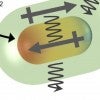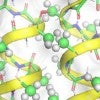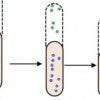
Laura Segatori named AIMBE fellow
Rice bioengineer Laura Segatori has been named a fellow of the American Institute for Medical and Biological Engineering.

Laura Segatori named AIMBE fellow
Rice bioengineer Laura Segatori has been named a fellow of the American Institute for Medical and Biological Engineering.

Haotian Wang named Sloan Research Fellow
Rice University chemical and biomolecular engineer Haotian Wang has been selected as a 2021 Alfred P. Sloan Research Fellow.

Junghae Suh named AIMBE fellow
Rice bioengineer Junghae Suh has been named a fellow of the American Institute for Medical and Biological Engineering.

Luminescent windows generate energy from inside and out
Rice engineers design and build windowpanes that redirect sunlight or illumination from indoors to edge-band solar cells.

Research could dramatically lower cost of electron sources
Rice University engineers have discovered technology that could slash the cost of semiconductor electron sources, key components in devices ranging from night-vision goggles and low-light cameras to electron microscopes and particle accelerators.

‘Soft’ nanoparticles give plasmons new potential
Bigger is not always better, but here’s something that starts small and gets better as it gets bigger.

People, papers and presentations Dec 7,2020
Richard Baraniuk, the Victor E. Cameron Professor of Electrical and Computer Engineering and a professor of computer science, is co-author of the introduction to “The Science of Deep Learning,” a special issue of the Proceedings of the National Academy of Sciences.

Rice names new round of IDEA winners
Six teams of Rice researchers have won backing from the InterDisciplinary Excellence Awards.

Folding proteins feel the heat, and cold
A new study shows proteins that presumably evolved to avoid water as they fold may actually behave in ways scientists did not anticipate.

Haotian Wang wins Packard Fellowship
Haotian Wang has been honored with a Packard Fellowship, one of 20 researchers in the nation to do so this year.

NSF renews Rice-based NEWT Center for water treatment
The National Science Foundation renews the Rice-based Nanotechnology Enabled Water Treatment Center for five years. The Engineering Research Center is dedicated to enabling access to clean water around the world.

There’s a reason bacteria stay in shape
A primal mechanism in bacteria that keeps them in their personal Goldilocks zones -- that is, just right -- appears to depend on two random means of regulation, growth and division, that cancel each other out. The same mechanism may give researchers a new perspective on disease, including cancer.

Rice backs studies of race, anti-racism
The Race and Anti-Racism Research Fund at Rice University has awarded grants to eight professors to develop better understanding of how race, racism and racial injustice affect society.